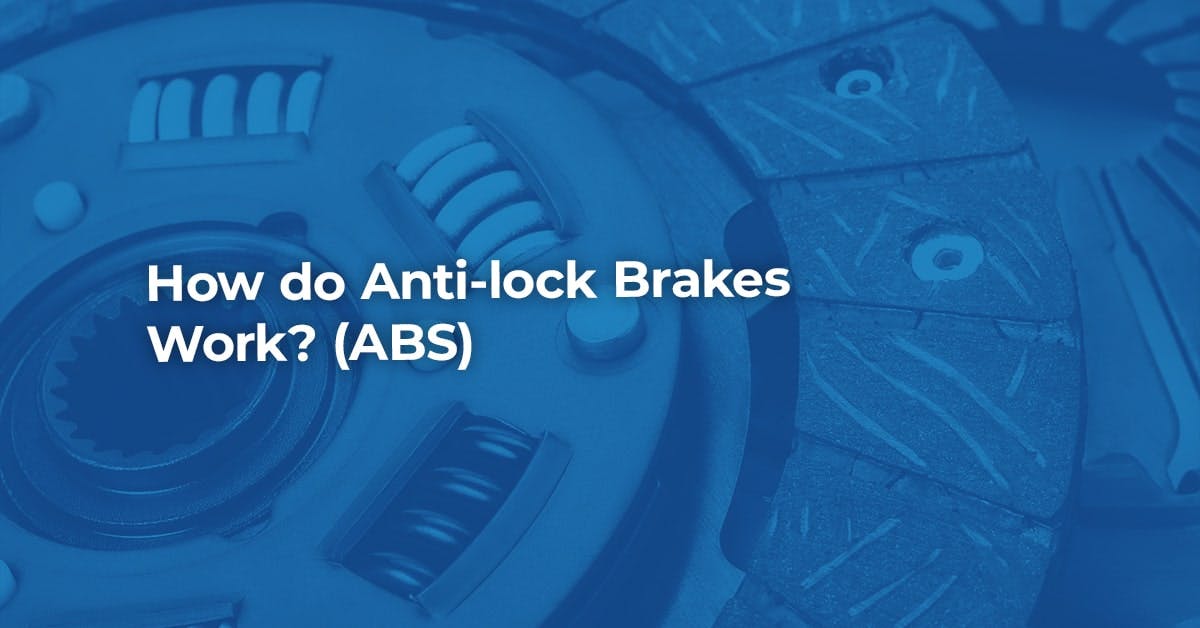An anti-lock brake system uses electronics to stop your car from skidding when you brake harshly, by controlling the braking force that is applied to the wheels.
This can help you to stop faster, and give you greater control over your steering in an emergency.
In this article, you will learn what anti-lock brakes are, how they work, and when they are most effective.
Page Contents
How Do Anti-lock Brakes Work?
The anti-lock braking system is made up of 4 main components:
- The speed sensors warn the system when a wheel is going to lock
- The valves decide how much pressure is in each brake line, relieving the pressure if it is too high
- The controller is a computer which controls the valves and monitors the speed sensors
- The pump can increase the pressure in the brake lines
The ABS system uses the sensors - which are located near each wheel - to detect ‘locking’ and notice when a wheel stops moving.
In response, the ABS system will automatically apply and release the brakes multiple times a second, thereby keeping the driver in control of their vehicle.
These components work together to help a driver steer in an emergency by restoring traction.
Helping the driver to avoid skidding, anti-lock brakes are particularly useful in wet weather conditions, where there is a greater possibility of aquaplaning.
What Are Anti-lock Brakes?
When you press down on the brake pedal, this activates pads that close on discs mounted to each wheel of the car.
If you apply the brakes too quickly, this increases the chances of the car’s wheels locking up.
When a wheel locks, it won’t turn and the vehicle will skid.
The stopping distance of the vehicle will increase, and the driver will have limited control over the car.
The anti-lock brakes system can give you greater control whilst braking at high speeds, and help the car to maintain stability whilst braking.
The ABS system prevents wheel lock up under heavy braking, and can ensure that the vehicle is always steerable.
If you ever need to perform an emergency stop, the anti-lock braking system will ensure that all four wheels are travelling and turning at the same speed, and that they slow down simultaneously.
Do All Cars Have Anti-lock Brakes?
As of 2012, all modern cars are fitted with anti-lock brakes - or ABS - as standard. Though, developments of the ABS system can be traced back to the 1970s.
If your vehicle uses anti-lock brakes, you will be able to feel the system working when you push on the brake pedal suddenly, and feel the car judder as it slows down.
This sensation is caused by the brakes applying and releasing quickly across all four wheels.
You may also feel a pulsing in the brake pedal when the ABS system is in operation.
When Are Anti-lock Brakes Most Effective?
Anti-lock brakes work best when applied promptly and firmly in an emergency, when driving on dry road surfaces.
Whilst anti-lock brakes are still very effective in rain, they will be less effective on snow and ice - particularly if your vehicle is not fitted with winter tyres.
Your car’s ABS system can determine when certain wheels have less resistance than others.
The anti-lock brakes can even out the braking force applied to each wheel, keeping your vehicle steady even when driving on roads that are both dry and wet in places.
What Does the ABS Warning Light Mean?
If your anti-lock braking system warning light is illuminated, this could mean that the system has been deactivated due to a malfunction.
You should check your brake fluid reservoir to make sure that the levels aren’t too low, as this can activate the ABS warning light.
If you find that this is the issue, then you can top up the brake fluid levels yourself or book a brake fluid replacement with a professional garage so that a mechanic can do this for you.
If this doesn’t resolve the issue, then it could be the case that one or more of the wheel sensors is damaged, and is no longer able to report back to the electronic control unit.
A loss of pressure in the braking system could also be the cause, perhaps the result of cracks or splits in the brake lines or brake fluid reservoir.
An illuminated ABS warning light can actually lead to an automatic fail on your MOT, and can be a sign that something is seriously wrong with your brakes.
If you are at all concerned about the health of your brakes, be sure to book with a professional garage as soon as you can so that you can stay safe on the road.






